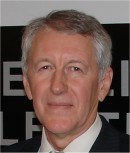|
Plenary
Lecture
Optimal FIR Estimation of Analog Quantities in
Discrete-Time State Space

Professor Yuriy S. Shmaliy
Department of Electronics
DICIS, Guanajuato University
Salamanca, 36855, Mexico
E-mail:
shmaliy@salamanca.ugto.mx
Abstract: Measurement is always provided with analog
sensors, whereas processing and estimation is typically
obtained using DSP power. This lecture examines the
problem of optimal filtering, interpolation, and
extrapolation of dynamic analog quantities existing in
continuous-time with the discrete-time state-space
finite impulse response (FIR) structures on an interval
of N past measurement points. An important feature of
such structures is that the optimal and unbiased
estimates converge when N is large, N >> 1, that is
typical for highly oversampled quantities. In line with
the general theory and estimation algorithms, we discuss
the estimation error and error bound (EB) derived via
the noise power gain (NPG). We show that the EB
specialized via the NPG in the three-sigma sense can
also be useful for Kalman filtering. A fast unbiased
Kalman-like estimation algorithm ignoring noise and
initial errors is discussed in detail. We show that this
algorithm is bounded input/bounded output (BIBO) stable
and more robust than the Kalman filter against outliers,
noise tails, and temporary model uncertainties. Examples
of applications are given for the Global Positioning
System (GPS)-based measurement of time errors in
ovenized crystal clocks that is provided with the fixed
horizon estimators, controlled system outputs estimated
on full-horizons, and extrapolation of errors in
National Time scales. Based upon these and other
examples, we show that the Kalman-like FIR estimator is
able to outperform the Kalman one if the noise
covariances are not known exactly, noise is not white,
and both the system and measurement noise components
need to be filtered out.
Brief Biography of the Speaker:
Dr. Yuriy S. Shmaliy is Full Professor in Electrical
Engineering of the University of Guanajuato, Mexico,
since 1999. He received the B.S., M.S., and Ph.D.
degrees in 1974, 1976 and 1982, respectively, from the
Kharkiv Aviation Institute, Ukraine. In 1992 he received
the Dr.Sc. degree from the Kharkiv Railroad Institute.
In March 1985, he joined the Kharkiv Military
University. He serves as Full Professor beginning in
1986 and has a certificate of Professor from the
Ukrainian Government in 1993. In 1993, he founded and,
by 2001, had been a director-collaborator of the
Scientific Center “Sichron” (Kharkiv, Ukraine) working
in the field of precise time and frequency. His books
Continuous-Time Signals (2006) and Continuous-Time
Systems (2007) were published by Springer, New York. His
book GPS-based Optimal FIR Filtering of Clock Models
(2009) was published by Nova Science Publ., New York. He
also edited a book Probability: Interpretation, Theory
and Applications (Nova Science Publ., New York, 2012)
and contributed to several books with invited chapters.
Dr. Shmaliy has 286 Journal and Conference papers and 80
patents. He is IEEE Fellow; was rewarded a title,
Honorary Radio Engineer of the USSR, in 1991; was listed
in Marquis Who's Who in the World in 1998; was listed in
Outstanding People of the 20th Century, Cambridge,
England in 1999; and was listed in The Contemporary
Who’s Who, American Bibliographical Institute, 2003. He
is currently an Associate Editor for Recent Patents on
Space Technology. He serves on the Editorial Boards of
several International Journals and is a member of the
Organizing and Program Committees of various Int.
Symposia. His current interests include statistical
signal processing, optimal estimation, and stochastic
system theory.
|
